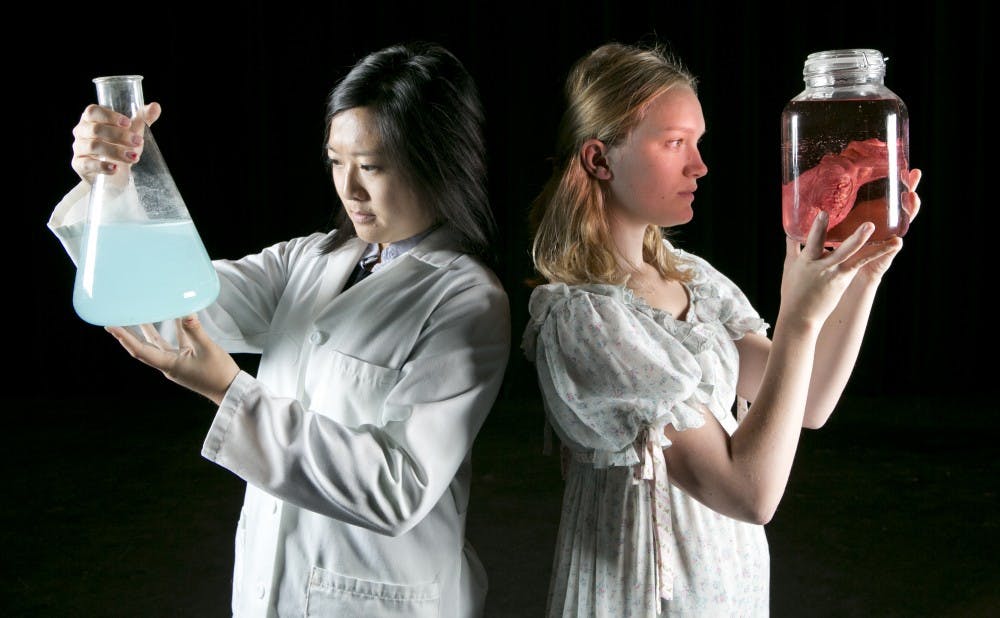The Theater Department’s fall mainstage play presents a simple question—what price would you pay for knowledge?
“An Experiment with an Air Pump,” by Shelagh Stephenson, examines two communities of scientists who are each struggling with the morals and ethics of medical research in their respective time periods. Joseph Fenwick of 1799, for example, is torn over the question of the dissection of cadavers, while Ellen of 1999 struggles with the decision to accept a job in genetic engineering that would require her to work with human embryos.
The characters, all played by Duke students, embody the liminal space between centuries—as the calendar ticks down toward the new year, the characters have to come to terms with their changing worlds. They live at a point of flux, times in which popular opinions were shifting away from traditionalism and toward more scientific-minded views. These evolutions in viewpoint are reflected in the turning century.
Director Jules Odendahl-James, director of academic engagement in the humanities, pointed out the continual relevance of such issues.
“The two families become connected in surprising ways, and the weight of that connection is something that reminds us of how far we have come in debates regarding ethics, equity and equality but very much how far we have to go,” she said in an email.
The inspiration for the play comes from "An Experiment on a Bird in the Air Pump," a 1768 painting by Joseph Wright of Derby. The piece depicts a group of scientists crowded around a table lit by candlelight, examining the efforts of a bird struggling to fly under the reduced air pressure created by the air pump. In the play, Ellen finds a fascination with this particular piece because of the way it replaces the traditional depiction of God with a scientist, subverting traditional beliefs for the pragmatism of science.
Conversely, the play subverts traditional views about the pragmatism of science in order to show scientists struggling with many of the same ethical and moral issues as the rest of the population. "An Experiment with an Air Pump" deconstructs the false dichotomy that separates science and the arts to reveal a common core and a shared humanity.
“More than just the ethical and moral questions, the play also delves into relationships between humans and how far an individual is willing to go for what they want,” said Harmony Zhang, a senior who plays Ellen.
Because of the split narrative style between 1799 and 1999, the set of the play is constructed in a particularly unique way. The stage is set up in the style of a curiosity shop, featuring scientific props and displays in a way that blends creepy with fascinating. By choosing a stage with roots in one time period but influences in the other, the actors are more able to embody the cohesive full-circle sentiment of the play.
“Even as we pursue progress, the tendrils of where that progress draws its history and the individuals upon which that progress is built remain a part of how we move forward and... how that movement forward can never escape its past,” Odendahl-James explained.
The show feels particularly relevant on a college campus, where moral and ethical issues are allowed to play out in real time. The race-related incidents at Yale University and the University of Missouri as well as incidents on Duke’s campus remind us that our actions are in many ways inextricably linked to our history. We cannot separate ourselves from our predecessors, and "An Experiment with an Air Pump" reminds us of that. As Fenwick and Ellen act in reflection, moving together though two hundred years apart, the Theater Department reminds us how important it is to keep such questions ubiquitous.
"Seeing different viewpoints is so important, and realizing that there are people who will support you and people who think differently than you," Zhang said. "I think the goal is to help individuals ask themselves, 'Where do I draw the line?'"
“An Experiment with an Air Pump” runs Nov. 12 until 14, Nov. 19 to 21 at 8 p.m. and Nov.15 and 22 at 2 p.m. Tickets are $10 for the general public and $5 for students, seniors, youth and Duke employees.
Get The Chronicle straight to your inbox
Sign up for our weekly newsletter. Cancel at any time.

